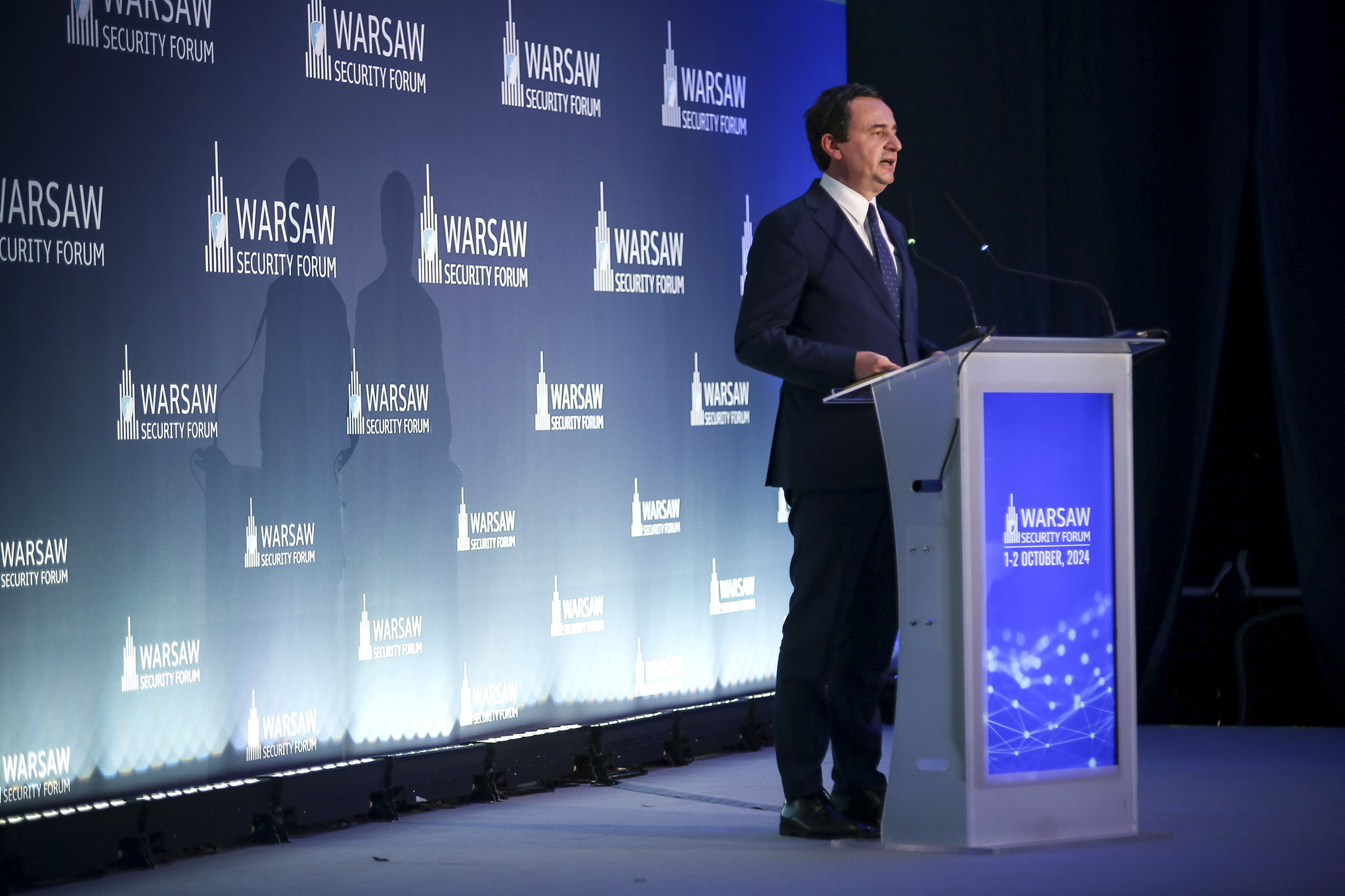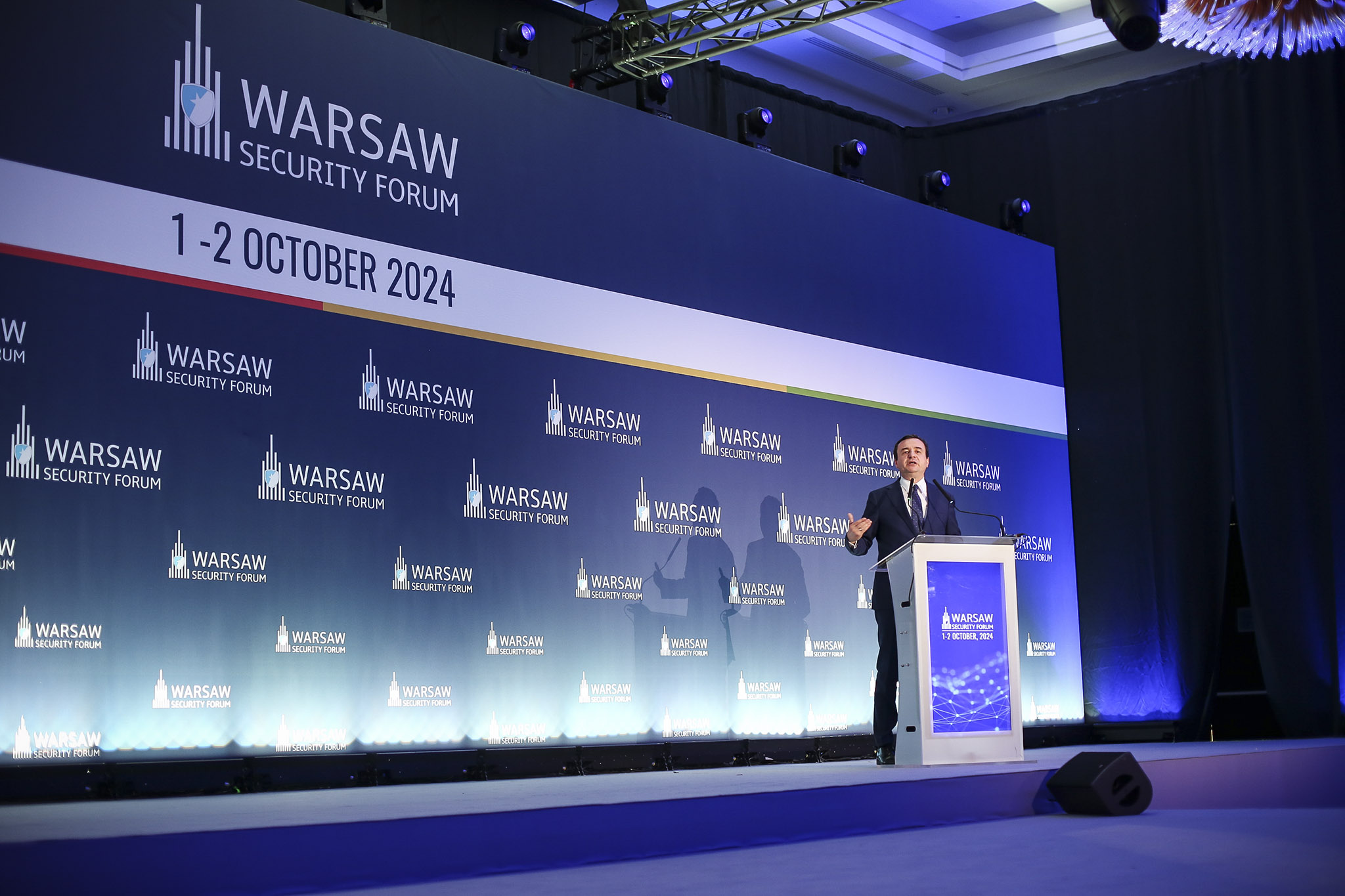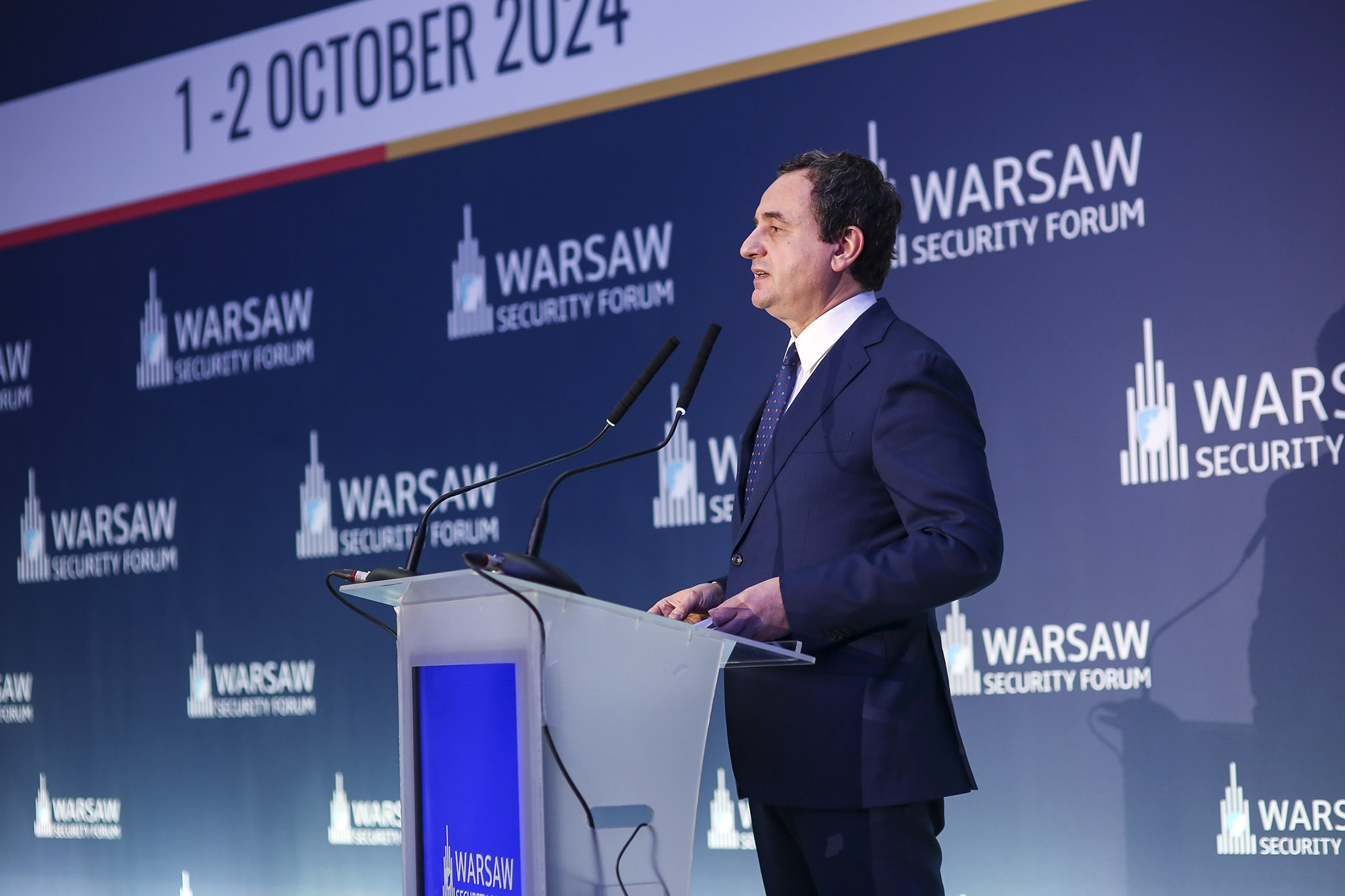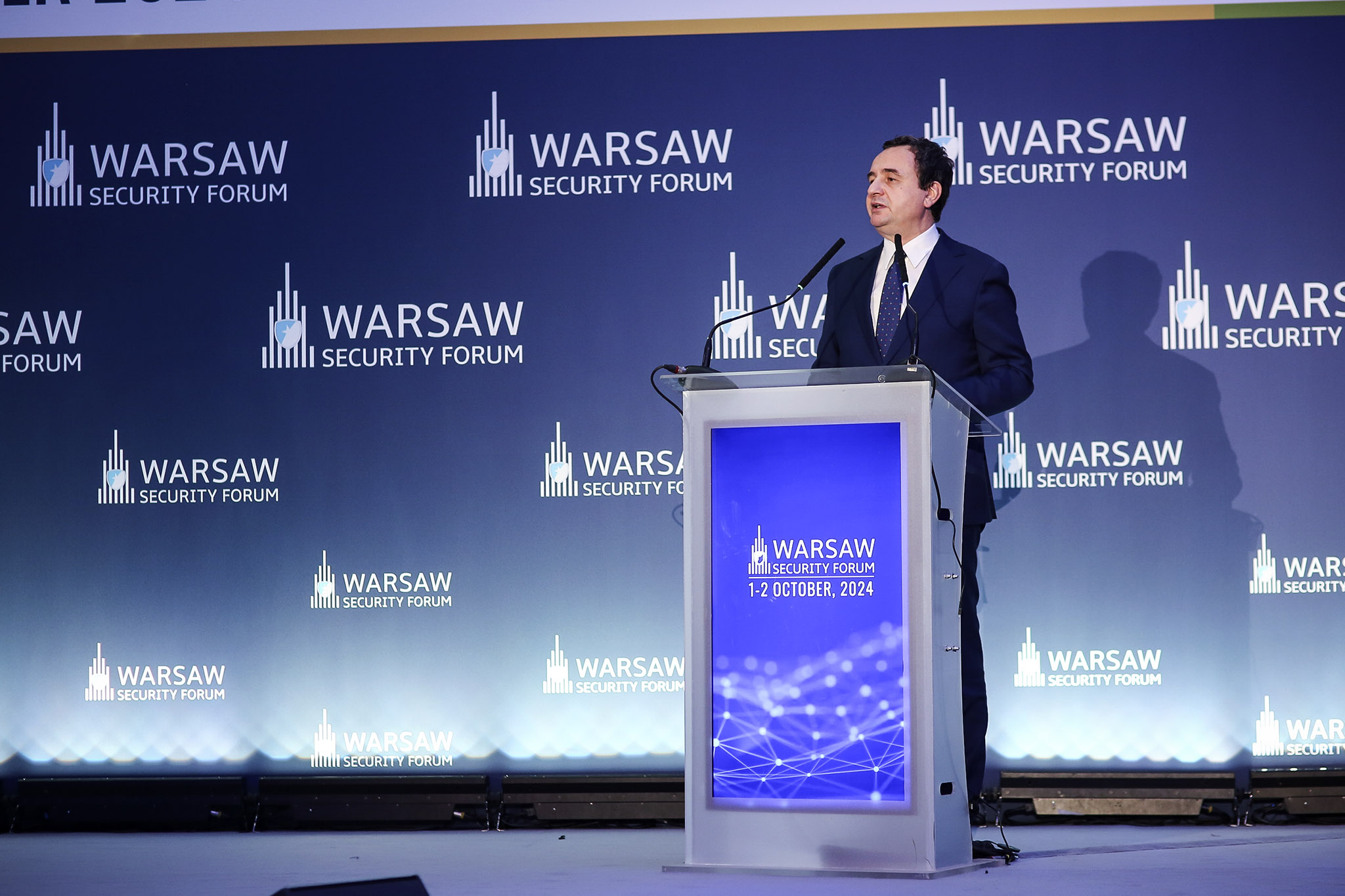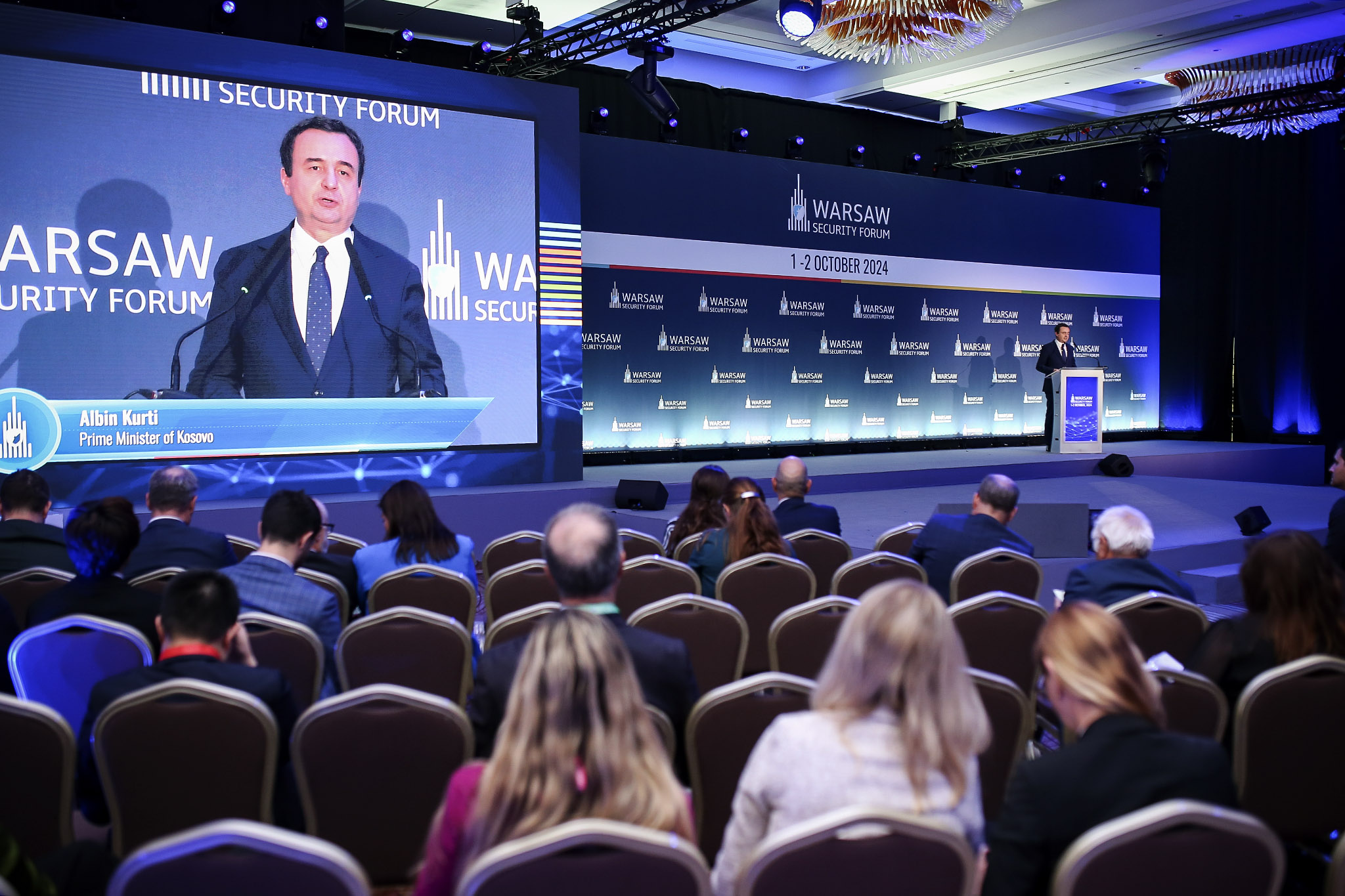Warshaw, 1 October 2024
The Prime Minister of the Republic of Kosova, Albin Kurti, delivered a speech on the interconnection between geopolitics and European integration, with particular attention to the Western Balkans, as part of the sessions of the Warsaw Security Forum (WSF).
In his speech, the Prime Minister discussed the security situation in Europe and the region, highlighting the threats posed by Russia and Serbia.
“Today, regional security in Europe is collective security for Europe. What happens in Ukraine or Poland, in the Eastern Partnership countries, and in our Western Balkans region affects not only the continent but the entire world. For us in the Western Balkans, particularly for the Republic of Kosova, full Euro-Atlantic integration into NATO and the European Union remains the ultimate goal of security. This, alongside sufficient defense capabilities and bilateral security agreements with our closest allies, forms a solid security umbrella. Like Russia, NATO and the EU have a history of enlargement. But unlike Russia, their expansion has proceeded in a peaceful and democratic manner,” said Prime Minister Kurti.
He emphasized the importance of EU and NATO enlargement, Kosova’s integration, and increased cooperation as a counter-response to Russian influence.
“In our region, no greater threat exists than Serbian aggression and the danger of Russian influence working in tandem with that aggression. Unfortunately, the same Serbia that committed genocide in Bosnia and Kosova under Milošević in the ’90s continues to threaten without repent. Serbia undermines peace in the Western Balkans by violating the sovereignty and territorial integrity of its neighbors, including Kosova. Last year, successive aggressive actions by Serbia culminated in a terrorist attack in Banjska, Zveçan, on September 24, 2023. Armed militants trained in Serbia, with millions of euros worth of armament, entered our country, staging an attack from the Banjska Orthodox Monastery. Their aim was to replicate Russia’s actions in Donbas in 2014,” the Prime Minister stated.
He added that Kosova is not only defending its territorial integrity, sovereignty, constitutionality, and the law, but also the prosperity and progress achieved, especially in the last three years.
“We must support Ukraine’s victory, prevent Russia’s malicious influence from spreading, and reinvigorate the EU accession process for the Western Balkans. Kosova looks forward to Poland’s EU presidency in January 2025. On December 15, 2022, Kosova officially applied for EU membership. We are committed to the reform process and regional cooperation, while safeguarding European values,” concluded Prime Minister Kurti, reiterating Kosova’s commitment to normalizing relations with Serbia and moving forward with constructive engagement in the process.
Full transcript of Prime Minister Kurti’s speech:
Dear representatives of the Republic of Poland,
Government leaders and other officials,
Esteemed experts,
Ladies and gentlemen,
Dear friends,
Dzien dobry!
I am very happy and honored to be here amongst all of you at the Warsaw Security Forum. It is my first time in this beautiful country, one with a rich and impressive history that I deeply admire.
I cannot help but note that we are gathering here together on a special day: the 100th birthday of former U.S. President Jimmy Carter. It’s hard to think of a more appropriate setting than this one, the Warsaw Security Forum, in which to celebrate what we may now refer to as the “Carter centennial.”
President Carter — both during his term in office and for a long time after — dedicated his life to the promotion of global peace and security. And in this sacred effort, it was none other than Poland that gave to him, and to the United States, one of the greatest of gifts: the distinguished Polish-American National Security Advisor and international-relations scholar born in Warsaw, Zbigniew Brzezinski.
Among President Carter’s pearls of wisdom came in 1980, in response to the Soviet Union’s invasion of Afghanistan. In his address to the American people on that tense occasion, he stated, I quote him: “History teaches, perhaps, very few clear lessons. But surely one such lesson learned by the world at great cost is that aggression, unopposed, becomes a contagious disease. The response of the international community to the Soviet attempt to crush Afghanistan must match the gravity of the Soviet action.”
I trust that the parallel to our world today is obvious to everyone. Forty-four years later, as Ukraine now finds itself the target of authoritarian aggression — now perpetrated by the Russian Federation — let us hope that we will not have to learn history’s lesson once again.
President Carter today is celebrating his birthday. He just turned 100, and we wish him good health and a great day today.
But here I understand we are in the midst of a time of mourning for the Polish people. I express my sincere wishes and hopes for a speedy recovery from the devastating floods in the south of Poland, and my condolences for the lives lost.
We stand by Poland at this difficult time, and we stand together as two countries strengthening our bilateral relations. In this respect, I am proud to announce that we have recently created our first-ever mission in Poland.
We are deeply grateful for Poland’s 25th anniversary of deploying troops to the NATO KFOR mission in Kosova. This was Poland’s first international military mission with NATO. Its contribution not only helped liberate Kosova, but has also enabled us to become a force for peace and stability. On May 27th, Kosova became a NATO Parliamentary Assembly Associate Member, opening the door for our people to give back and contribute to safeguarding and promoting democratic values alongside our allies.
Today, regional security in Europe is collective security for Europe. What happens in Ukraine or Poland, in countries of the Eastern Partnership, and in our region of the Western Balkans, affects not only the continent but the entire world.
For us in the Western Balkans, and particularly for the Republic of Kosova, full Euro-Atlantic integration into NATO and the European Union, remains the ultimate security goal. This, alongside sufficient defense capabilities and bilateral security agreements with our closest allies, forms a solid security umbrella.
Like Russia, NATO and the EU have a history of enlargement. But unlike Russia, their expansion has proceeded in a peaceful and democratic fashion.
The respective projects of EU and NATO enlargement are not unrelated; rather, they go hand-in-hand, and serve to protect and promote the security of the entire European continent — and with it, the world.
This truth is borne out by the behavior of the EU and NATO countries themselves. The memberships of these two organizations overlap, though not completely.
Some EU member states are not part of NATO, just as some NATO member states are not part of the EU.
But there seems to be a trend toward greater alignment in their respective memberships, achieved through the prospective enlargement of both organizations among countries in Europe. Sweden and Finland’s recent accession to NATO, serves as an example of EU countries’ increasing willingness and desire to join NATO. Indeed, the EU needs NATO in this century perhaps even more than in the previous one.
By contrast, in the Western Balkans, it is the NATO countries that are seeking to join the EU, as it has become apparent that Serbia has no qualms about harassing every one of its neighbors that are not EU member states — including even the ones that are members of NATO, namely Montenegro and North Macedonia and my country, Republic of Kosova, which is still not integrated in NATO but has NATO integrated into itself.
So, in northern Europe the EU wants to join NATO, whereas in the Western Balkans, it is NATO that wants to join the EU. There is, then, at least this performative or behavioral demonstration of the thesis that peace and security on the European continent is best served through the enlargement of both organizations. The EU and NATO can together attain more than either can achieve on its own.
I am well aware that Poland commits 4.3% of its GDP to defense and plans to increase this to 4.7% by 2025. Kosova currently commits 2% of its GDP to defense, meeting the NATO target, and we are determined to progressively increase this commitment in line with the threat level Kosova faces, either as a country or as a partner in peacekeeping endeavors among allied forces.
We agree with Poland that more collective defense spending is necessary, and we share the United States’ view that a greater share of this spending must come from European allies.
Ladies and gentlemen,
The lack of Euro-Atlantic integration, even on legitimate grounds, creates a reasonable wariness and a real risk of conflict in our region. Conflicts in the Western Balkans have historically arisen from attempts to subjugate and colonize other nations, driven by hegemonic aggression and Russia’s malign influence.
In our region, no greater threat exists than Serbian aggression and the danger of Russian influence working in tandem with that aggression. Unfortunately, the same Serbia that, under the Milosevic regime in the 90’s committed genocide in Bosnia and Kosova, continues to threaten without repent.
Serbia undermines peace in the Western Balkans by violating the sovereignty and territorial integrity of its neighbors, including Kosova. Last year, successive aggressive actions by Serbia culminated in a terrorist attack in Banjska, in Zveçan on September 24, 2023. Armed militants trained in Serbia, with millions of Euros worth of armaments, entered our country, staging an attack from the Banjska Orthodox Monastery. Their aim was to replicate Russia’s 2014 actions in Donbas.
They certainly had the heavy artillery necessary to do so. After the attack, our Police sequestrated 105 different types of firearms, over 80,000 rounds of ammunition, 140 hand grenades, 9 anti-personnel mines, 36 detonators, and more than 52 rocket launchers.
And so, it is no exaggeration to say that, on September 24th, our police were not just protecting Kosova but also preventing the opening of a new armed conflict, backed by Serbia and Russia, which could have had severe international repercussions. While Serbia continues to destabilize the north of Kosova, Russia seeks to distract attention from Ukraine and escalate conflict elsewhere. Banjska presented a perfect opportunity for both.
If it had been successful, the attack would have led to a higher concentration of NATO forces in Kosova, thereby pulling limited military resources away from Ukraine. This would then have created an opening for Russia to escalate its conflict in Ukraine and even to extend it further into Europe.
Dear esteemed colleagues,
We are not just protecting the sovereignty of our young and democratic republic, we are also indirectly fighting Russia, which in our region acts in close collaboration with Serbia. Offering carrots to Serbia in the hope of peaceful reform is not the solution and definitely is not working. Instead, we must implement active safeguards against all those who threaten peace and security in the Western Balkans.
It is essential that Kosova’s institutions, which our allies helped build, are present in the north, especially those related to peace and security. The more our institutions are present, the greater the stability, leading to prosperity and reducing the chances of provocation or conflict. And we have to defend not only territorial integrity, state sovereignty, constitution and law, people and society. We also have to defend prosperity, we have to defend the progress. In three years only in Kosova our GDP grew by 33%. In only three years, we doubled our exports and more than doubled FDI. In only three years, we became a champion in the Western Balkans in terms of democratic progress, by coming out first according to Freedom House, Transparency International, Reporters Without Borders, World Justice Project, V-dem Institute, showing that economic growth and democratic progress go hand-in-hand. Therefore, when we speak of defending and securing and protecting, it is not only that we have to do this to our being, but also to our doing; not merely what we have, but also what is in the making. So defending the progress, becomes the same as defending people.
My government is working hard toward this goal. We have established fully operational police stations, gas stations, and supermarkets in the four municipalities in the north, supported by our government. Routine administrative processes such as business registration and the issuance of utility bills have begun to be carried out without fanfare. This represents real progress on the path to normalcy for our citizens in the north. We are committed to providing security and prosperity for all, regardless of what ethnic, religious, or other community they belong to.
But the threat is not over. While we hope that Sergeant Afrim Bunjaku will be the last victim, we remain vigilant. Now more than ever, we need NATO’s support, Poland’s support, and the support of all our allies to protect and promote our shared interests.
Kosova has proven itself more than ready to do its part as well, especially in the defense of Ukraine. To that end, we have adopted all EU and U.S. sanctions packages against Russia, Belarus, and their proxies. Our Parliament has approved a resolution to house up to 5,000 Ukrainian refugees, and we have hosted 21 Ukrainian journalists under temporary protection. Additionally, Kosova has joined the Demining Coalition within the Ukraine Defense Contact Group, and over 100 Ukrainians have been trained in demining by our military.
Our second package of military aid for Ukraine, consisting of mortar rounds, was approved this year, following the first package of trucks and tactical vehicles. Furthermore, in cooperation with the Ministry of Defense of the United Kingdom, in the context of the Interflex operation, we are currently training Ukrainian recruits in combat tactics — 34,000 thus far.
Our civil society has also shared with Ukrainian counterparts our experience in dealing with trauma from conflict-related sexual violence.
In short, Kosova stands with Ukraine unconditionally and in full alignment with European Foreign and Security Policy.
Dear friends,
Earlier this year, Poland’s Foreign Minister Radosław Sikorski spoke of a bi-directional EU enlargement, reinforcing both the East and the Western Balkans. We must support Ukraine’s victory, prevent Russia’s malign influence from spreading, and reinvigorate the EU accession process for the Western Balkans.
Kosova looks forward to Poland’s EU presidency in January 2025. On December 15, 2022, Kosova formally applied for EU membership. We are committed to the reform process and regional cooperation, while safeguarding European values.
I reaffirm my commitment to normalizing relations between Kosova and our northern neighbor Serbia and to constructively engage in the process to move it forward. There is much work ahead, but I am confident that, together, we can succeed.
Thank you very much.
Last modified: October 3, 2024
